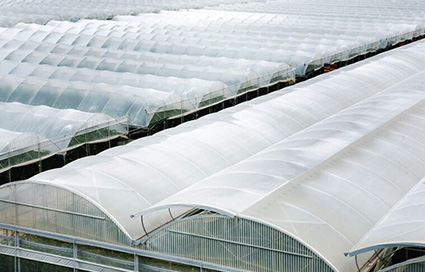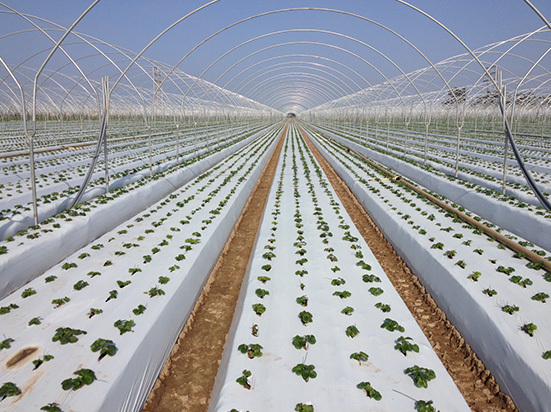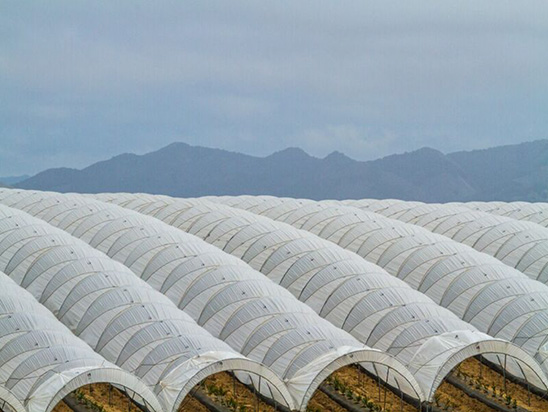With the aid of agricultural plastics, growers can secure and significantly increase produced output per hectare while enhancing crop quality.
The wide range of plasticulture applications includes greenhouse, mulch and silage stretch films.
AGRICULTURAL FILMS
Over
30 Years of Excellence – That’s the Difference
AA Politiv (1999) Ltd. was founded in 1985 and has been privately owned since then. The company is under excellent management, implementing the highest level of self-evaluation motivating it toward forward with continual improvement, while upholding the quality of the products and professional services it delivers to all its customers. This is how AA Politiv has succeeded, in a very short time, to become Israel’s leading manufacturer of agricultural films, indeed one of the world leaders in the field.
Specializes in the manufacture of an extensive range of smart films for agriculture and industry with a sizable manufacturing capacity and a range of machinery capable of addressing market requirements in Israel and worldwide.


Mulch Film
Mulch film is laid on the ground for protection, insulation and for protection against soil temperature extremes. These films are capable of fully transmitting visible light, reflecting visible light or selectively transmitting visible and ultraviolet light. Politiv manufactures a broad range of multilayer films, transparent, single-shade or dual-shade, in various dimensions and according to customer requirements. These films are manufactured in thicknesses ranging from 20 microns to 400 microns and at widths of up to 14.5 meters.
Advantages of Using Mulch Film:
Earlier crop harvesting in winter: the soil temperature below the mulch film is higher than exposed soil. As a result, plant development is expedited and can be harvested sooner.
Reducing evaporation and retaining soil moisture: a mulch film reduces water evaporation (up to 50% according to tests and observations in the USA), thereby reducing water consumption.
Maximum utilization of fertilizers.
Preventing soil compaction and creating a film over the topsoil.
Protecting the soil against erosion.
Cleaner vegetable and fruit.
Weed inhibitor: mulch films (except for the transparent film) fully or partially block visible light, thereby substantially reducing weed growth and herbicide use.
Reducing insect-borne diseases: reflective films which reflect ultraviolet radiation and films which manipulate visible light significantly reduce plant morbidity due to insect-borne diseases.
Types of Mulch Film:
Transparent Mulch Film: the well-known transparent film. Has been in use for many years on all kinds of crops. This film is the most efficient of all films for warming the soil. The disadvantage of this film is that it does not prevent weeds and herbicides must be used.
Black Mulch Film: absorbs visible light (photosynthesis) thereby significantly reducing weeds below the area covered by the film.
Black/White Mulch Film: this film is opaque black on the one side, blocking visible light while the other side is white, partially reflecting visible light thereby preventing the sheet from overheating and damaging the fruit.
Colored Mulch Films
Films with Selective Light Transmission: sheets enabling warming of the soil on the one hand while on the other hand reducing weeds below the film. The film color has a major effect on the degree of soil warming and on the kinds of insects attracted to it. These films are available in brown, green, yellow, and blue.
Reflective Films: films which partially reflect ultraviolet radiation, “blinding” the insects and thereby reducing crop morbidity.
Multicolor Films: films which combine the advantages of black or brown films in reducing weeds and the advantage of the selective films in preventing crop morbidity. The colors of the films can be adapted to suit the crop type and the growing season.
Film for Agriculture
A.A Politiv manufactures a variety of products for agriculture, such as: sheets for greenhouse coverings, low tunnels, and soil coverings. The sheets are in a variety of thicknesses, widths and colors, according to the customer’s requirements.
Politiv’s agricultural sheets are tailored to the needs of the end customer and are suited to the growth, greenhouse structure and climatic conditions in which the growth occurs.
Cover Films for Growing Tunnels
Greenhouses and high tunnels are structures covered with a solar ray-transmitting film. The structure provides physical protection of the crops against winds, rain, snow and other natural hazards. It also enables interior climate control. The better the climate control inside the structure, and the better the conditions within, the better the quality of the resulting crop will be. Growing inside climate-controlled greenhouses enables production and a supply of vegetables year round – high quality vegetables at reduced use of pesticides.
Basic Properties of the Greenhouse Cover Films:
Good Mechanical Properties: the films’ mechanical properties are determined by the film composition and content. All AA Politiv films comply with the requirements of Israeli Standard 821 Part 2.
UV Resistance: polyethylene is damaged by the ultraviolet rays (250 to 400 nanometer wavelengths). This damage affects the mechanical properties, which are degraded until eventual failure to transmit light through the film. To prevent or minimize this damage, the right stabilizers need to be added. The types and concentration of stabilizers varies according to the lifetime expected from the film, geographic location and exposure to chemicals.
Proper Transmission of Visible Light: visible light is the spectrum required for plant photosynthesis to take place. Visible light transmission can be controlled and planned according to the requirements of the plants, the growing season and the growing location.
Low tunnels films
Low tunnels enable growing vegetables under protected conditions, extension of the growing season, earlier harvesting during cold seasons and improvement of the crop quality. These films feature very high mechanical strength per thickness, facilitating quick and easy spreading. These films are adapted to the climate, region, type of crop and season and can be ordered with ventilation holes of different sizes and at different intervals in accordance with the needs of your crop.

